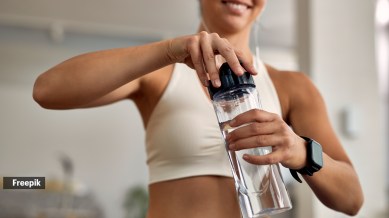📣 For more lifestyle news, click here to join our WhatsApp Channel and also follow us on Instagram
ORS vs Coconut water: Which is the better option to tackle dehydration?
For most people, daily hydration can be managed through water and foods rich in electrolytes. Bananas, leafy greens, citrus fruits, curd and coconut water are excellent natural sources.

Staying hydrated is essential for effective functioning of the body. But drinking just water is not enough. Throughout the day, our body loses water in the form of sweat, urine and evaporation — and with that, we end up losing vital nutrients and minerals that are essential for good health. In extreme cases, the body can even become dehydrated.
Dr Smriti Jhunjhunwala, BHMS nutritionist and dietitian, explained that on a physiological level, dehydration doesn’t simply mean loss of water but also loss of electrolytes, varying body temperature, urine concentration, weakness and a lot of other symptoms follow. Chugging water alone cannot cover up for these losses, and therefore drinks with higher hydration index have been considered more efficient in cases of dehydration.
Hot climates, dehydration, vomiting or diarrhoea can strip the body of vital salts quickly. In such cases, ORS is the most reliable choice as it is formulated for rapid absorption. Energy drinks or high-caffeine beverages should be avoided, as they may worsen fluid loss. However, coconut water poses as a strong contender to ORS when it comes to tackling dehydration.
Khushma Shah, Clinical Dietitian, Diet Clinic By Khushma Shah, told indianexpress.com that coconut water is a natural source of electrolytes like potassium, magnesium, and sodium. It’s refreshing, mildly sweet, and ideal for mild dehydration caused by heat, light exercise, or fasting. It helps replenish fluids while providing some natural sugars and antioxidants.
However, she shared that it is low in sodium compared to ORS, which limits its effectiveness in severe dehydration (like after vomiting or diarrhea).
“ORS, on the other hand, is scientifically formulated with the right balance of glucose and electrolytes—especially sodium and potassium—to quickly restore lost fluids and salts,” said Shah, who believes it is the best choice for moderate to severe dehydration, especially during illness, heavy sweating, or prolonged outdoor activity.
How much should you drink?
When it comes to coconut water, Shah recommended 1–2 glasses (200–400 ml) per day is enough for mild dehydration or daily hydration support. “ORS you should sip slowly as needed—generally 200–400 ml after each episode of fluid loss (like diarrhea, vomiting, or intense sweating),” she said, warning against overuse.
Other natural alternatives include lemon water with a pinch of salt and sugar, as well as buttermilk with a little salt and cumin. “In short, choose coconut water for gentle rehydration and ORS for medical or severe dehydration, as both can complement each other depending on your body’s needs,” she added.
Dr Jhunjhunwala further told indianexpress.com that not just liquid drinks but also the foods you eat can help you in staying hydrated. “A human body can also restore the water balance by eating foods with higher levels of water, like melons, tomatoes, soaked beans, and all the raw fruits and vegetables contain more water as compared to cooked ones. A whole fruit eaten will keep up your body water for a longer duration as compared to plain water,” she says.
For most people, daily hydration can be managed through water and foods rich in electrolytes. “Bananas, leafy greens, citrus fruits, curd and coconut water are excellent natural sources. If you are not exercising heavily or living in extreme conditions, this everyday intake is usually enough,” said Shah. However, she reminded that balance matters. “Too much sodium can raise blood pressure, while too little can leave you weak. Stay hydrated, eat a variety of foods, and seek medical advice if you have ongoing concerns,” she added.
DISCLAIMER: This article is based on information from the public domain and/or the experts we spoke to. Always consult your health practitioner before starting any routine.
📣 For more lifestyle news, click here to join our WhatsApp Channel and also follow us on Instagram